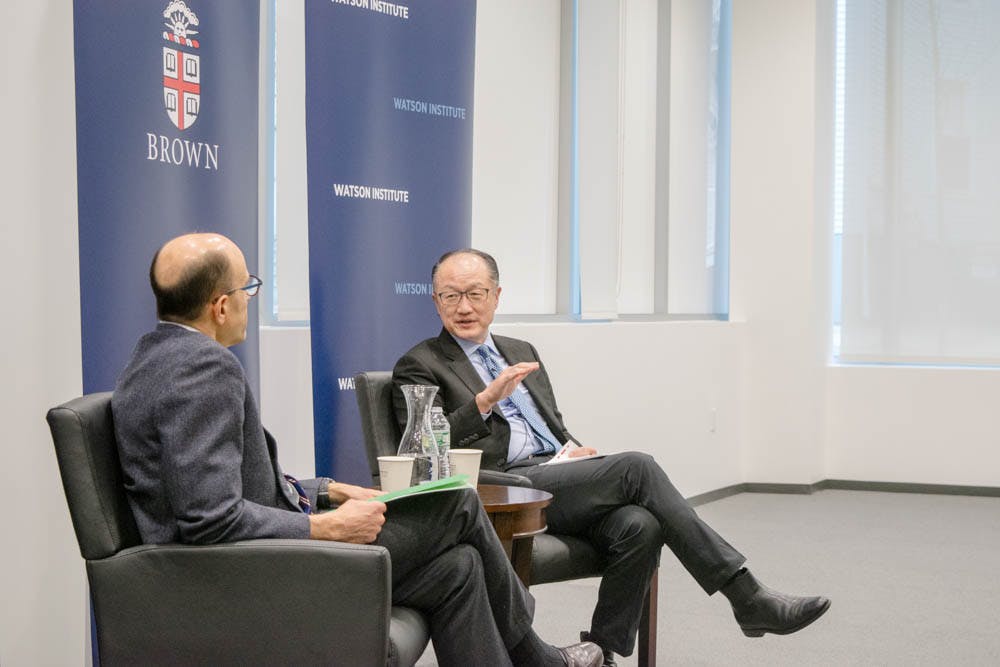What can Brown prepare you for? If you use Jim Yong Kim ’82 P’22 as a model, it could prepare you for a spot on Forbes’ list of the most powerful people in the world, a teaching position at Harvard, a presidency at Dartmouth, an opportunity to drive the World Health Organization’s work on HIV/AIDS and a tenure leading the World Bank.
A Brown degree might even prepare you to be a senior fellow in International and Public Affairs, just like Kim, who gave a talk Thursday to commemorate his senior fellow acceptance at the Watson Institute of International and Public Affairs. Watson Institute Director Edward Steinfeld — who moderated the Watson Distinguished Speakers Series talk — introduced Kim and thanked him “for continuously giving back to the community here,” referencing Kim’s work as a trustee on the Brown Corporation.
Kim spoke about his vision for tackling climate change, his time at the World Bank and strategies for developing impoverished countries. Kim has taken a position as Vice Chairman and Partner at Global Infrastructure Partners, an international group that invests in global infrastructure, after stepping down as president of the World Bank Feb. 1.
Kim is looking to address prevailing issues in developing countries — particularly, climate change.
“The reason I stepped down now … is if you take all the money that’s coming through foreign assistance, and you then add to it all the money that’s coming through multi level development banks, it doesn’t begin to touch the need in developing countries,” Kim said. “Almost every day I read something new about climate change that really worries me,” he added. “There’s not a single African leader who can’t tell you story after story about how climate change is affecting their lives. The Syrian crisis followed three years of drought in a row.”
To Kim, climate change and global economics are inherently intertwined: “What are the forces in the world powerful enough to drive a complete change in the way we think about energy? … There’s no force I can see other than market forces,” Kim said. “We have to find ways of aligning market forces so that, literally out of greed, people are running to make investments that will protect us from the most devastating impacts of climate change.”
Kim thinks that some vital steps to combat climate change will require drastic provocation. “I’m waiting for that moment where something so devastating happens that people are looking around saying ‘Oh my God, this is terrible, what do we do?’ And the first answer is a price on carbon,” he said.
Kim also advocated for investment in developing countries to improve quality of life by increasing internet access, explaining that this will increase desire for economic prosperity.
For Kim, improving the quality of life in developing countries has personal roots. His parents met and married in the United States, and “by coming to the United States, their aspirations were lifted, and when they went back to Korea they thought, ... ‘We’re not going to able to provide the things the United States can provide to our kids. And so, we’re going to move to the United States,’” he said.
“Now, everyone on Earth is going to be able to have the experience my parents had directly, and they’re going to see it right on their smartphones,” Kim said.
“Developing human capital” to prepare for the future economy was another idea Kim discussed. When asked about the role Brown and other institutions of higher learning can play in this process, Kim said that the University, with President Christina Paxson P ’19 “leading this charge,” will try to develop ideas to promote higher quality higher education around the world.
Eve Formisano, director of Strategic Initiatives at the School of Professional Studies, came to the event because she was “excited to learn about what (Kim is) doing next,” she said. “It’s exciting for him to bring … his global perspective and thoughts on how his Brown experience impacted his life beyond Brown.”
Kimberly Duru GS attended Thursday’s talk and had seen Kim speak at the Watson Institute previously. “It was amazing,” Duru said. One of her takeaways from the talk was that “leaders and countries and everybody in leadership positions need to be very innovative about challenges we have now. Things are changing rapidly, and the old methods may not honestly work.”





